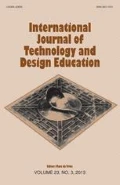Abstract
While the goal of the vocationalisation of school curriculum has been viewed as fallacious and mythical, many countries have continued to introduce practical subjects in schools. This paper reports on the views of three teachers involved in the development of the technology studies curriculum. The curriculum developers’ views were corroborated with a focus group discussion involving teachers that were invited for the first ever primary school technical teacher training. The in-depth discussions focused on their understanding of the rationale and future of technology studies in the primary school curriculum and how to build teacher capacity for the subject. The teachers viewed the programme as providing primary school learners with skills for their survival after school as chances of proceeding to secondary were limited. Learning in this programme was also seen as likely to develop attitudes necessary for technology studies at tertiary level. In conclusion, the teachers hold the assumption similar to skills development for jobs and employment while technological literacy is not viewed in its broad sense and this has implications on how and what to teach.


Similar content being viewed by others
References
Baker, B., Sciarra, D., & Farrie, D. (2012). Is school funding fair? A national report card. Newark, NJ: Education Law Centre.
Borko, H. (2004). Professional development and teacher learning: Mapping the terrain. Educational Researcher, 33(8), 3–15. doi:10.3102/0013189X033008003.
Castellano, M., Stringfield, S., & Stone, J. R. (2003). Secondary career and technical education and comprehensive school reform: Implications for research and practice. Review of Educational Research, 73(2), 231–272.
Chikasanda, V., Otrel-Cass, K., & Jones, A. (2011). Teachers’ views about technical education: Implications for reforms towards a broad based technology curriculum in Malawi. International Journal of Technology and Design Education, 21(3), 363–379. doi:10.1007/s10798-010-9125-5.
Çınar, H., Döngel, N., & Söğütlü, C. (2009). A case study of technical and vocational education in Turkey. Procedia-Social Behaviour Sciences, 1, 160–167. doi:10.1016/j.sbspro.2009.01.030.
Cohen, L., Manion, L., & Morrison, K. R. B. (2011). Research methods in education. London: Routledge.
Creswell, J. W. (2007). Qualitative inquiry & research design: Choosing among five approaches. Thousand Oaks: Sage.
Darling-Hammond, L., Ancess, J., & Falk, A. (1995). Authentic assessment in action. New York: Teachers College Press.
de Vries, M. J. (2006). Two decades of technology education in retrospect. In M. J. de Vries & I. Mottier (Eds.), International handbook of technology education: Reviewing the past twenty years (pp. 3–11). Rotterdam: Sense.
Delors, J. (2013). The treasure within: Learning to know, learning to do, learning to live together, and learning to be. What is the value of that treasure to 15 years after its publication. International Journal of Review for Education, 59(3), 319–339. doi:10.1007/s11159-013-9350-8.
Denzin, N. K., Lincoln, Y. S., & Giardina, M. D. (2006). Disciplining qualitative research. International Journal of Qualitative Studies in Education (QSE), 19(6), 769–782.
Hager, P., & Hyland, T. (2003). Vocational education and training. In N. Blake, P. Smeyers, R. Smith, & P. Standish (Eds.), The Blackwell guide to the philosophy of education (pp. 271–287). Oxford: Blackwell.
Jones, A. (2009). The development of technology education internationally. In A. Jones & M. J. de Vries (Eds.), International handbook of research and development in technology education (pp. 13–16). Rotterdam: Sense Publishers.
Kelley, T., & Kellam, N. (2009). A theoretical framework to guide the re-engineering of technology education. Journal of Technology Education, 20(2), 37–49.
Kelly, P. (2006). What is teacher learning? A socio-cultural perspective. Oxford Review of Education, 32(4), 505–519. doi:10.1080/03054980600884227.
Kennedy, O. O. (2012). Philosophical and sociological overview of vocational and technical education in Nigeria. College student Journal, 46(2), 274–284.
King, K., & Martin, C. (2002). The vocational school fallacy revisited: Education, aspiration and work in Ghana 1959–2000. International Journal of Educational Development, 22(2), 5–26. doi:10.1016/S0738-0593(00)00083-3.
King, K., & Palmer, R. (2010). Planning for technical and vocational skills development. Paris: UNESCO, International Institute for Educational Planning.
McRobbie, C. J., Ginns, I. S., & Stein, S. J. (2000). Preservice primary teachers’ thinking about technology and technology education. International Journal of Technology and Design Education, 10(1), 81–101. doi:10.1023/A:1008941520152.
Minghat, A. D. Y., & Ruhizan, M. (2011). A suitable framework for technical and vocational education in Malaysia. Procedia-Social Behaviour Sciences, 9, 1233–1237.
Ministry of Education Science and Technology. (2007). National Education Sector Plan 2008–2017. Lilongwe: Ministry of Education and Vocational Training.
Ministry of Education and Vocational Training. (2001). Primary school teaching syllabus for Standards 5, 6, 7 and 8. Domasi: Malawi Institute of Education.
Msiska, F. G. W. (1994). Some practical limits of curriculum vocationalization as a remedy to school leavers’ unemployment: Focus on Malawi. International Review of Education, 40(2), 135–148.
National Economic Council. (2003). Vision 2020: The national long term development perspective for Malawi. Retrieved from http://www.sdnp.org.mw/malawi/vision-2020/chapter-8.htm.
National Research Centre for Career and Technical Education. (2011). Professional development for seconadry career and technical education: Implications for change. Kentucky: University of Luiseville.
National Research Council of Malawi. (2002). Science and technology policy for Malawi (Vol. 2006). Lilongwe: Office of the President and Cabinet.
Olomi, D. R., & Sinyamule, R. S. (2009). Entrepreneurial inclinations of vocational education students: A comparative study of male and female trainees in Iringa region, Tanzania. Journal of Enterprising Culture, 17(01), 103–125. doi:10.1142/S0218495809000242.
Shulok, N., Moore, C., Jez, S. J., & Chisholm, E. (2012). Career opportunities: Career technical education and the college completion agenda Part I: Structure and funding of career technical education in the California Community Colleges. California: Sacramento, Califonia State University.
Strauss, A., & Corbin, J. (1998). Basics of qualitative research: Techniques and procedures for developing grounded theory. Thousand Oaks: Sage.
Timperley, H., Wilson, A., Barrar, H., & Fund, I. (2007). Teacher professional learning and development: Best evidence synthesis (BES). Wellington, NZ: Ministry of Education.
Ukuma, S., Ochedukwu, J. O., & Deke, G. N. (2013). Revamping vocational and technical education in Nigeria for sustainable development. Mediterannean Journal of Social Sciences, 4(12), 55–59.
UNESCO-UIS. (2006). Participation in formal technical and vocational education and training programs worldwide: An initial statistical study. Quebec: UNESCO-UNEVOC.
UNESCO-UNEVOC. (1996). The development of technical and vocational education in Africa: Case studies from selected countries (pp. 1–383). Dakar: UNESCO Regional Office.
World Bank. (2004). Cost, financing and school effectiveness of education in Malawi: A future of limited choices and endless opportunities. Retrieved January 27, 2008, from http://siteresources.worldbank.org/AFRICAEXT/Resources/No_78.pdf.
Zimmerman, T. F. (2010). A descriptive review of the development and implementation of a funding model for the Kentucky Community and Technical College System: The First 10 Years, 1998–2008. (Ph.D), Mississippi State University, Mississippi, USA.
Acknowledgments
We acknowledge support provided by the TEVET Reform Project which funded curriculum development workshop and the technical teacher training. The funding was made available by CIDA through the project implemented by University of Regina in partnership with the Malawi Polytechnic. On another note we acknowledge the hospitality of management and staff of Lilongwe Technical College for hosting and providing the facilities for the curriculum development, master training of trainers and technical teacher training workshops. We also thank all the master trainers and the primary school teachers for their valuable contributions.
Author information
Authors and Affiliations
Corresponding author
Rights and permissions
About this article
Cite this article
Chikasanda, V.K., Mgawi, R.K., Mtemang’ombe, D. et al. Introducing technology studies in Malawi’s model primary schools: towards building a technologically literate society. Int J Technol Des Educ 25, 453–466 (2015). https://doi.org/10.1007/s10798-014-9292-x
Accepted:
Published:
Issue Date:
DOI: https://doi.org/10.1007/s10798-014-9292-x




